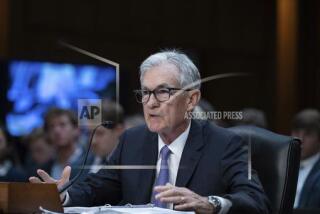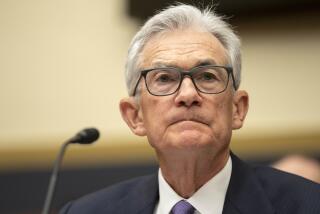Fed Chief: Worst of Slump Over
- Share via
WASHINGTON — Federal Reserve Board Chairman Alan Greenspan said Tuesday that fresh economic data has convinced him that the worst of the recession is over, and the credit crunch that has crippled the economy for months is beginning to ease.
In a surprisingly optimistic speech on the eve of a possible Persian Gulf war, Greenspan said that the Fed’s moves to cut interest rates and lower bank reserve requirements have flooded the banking system with so much cash that banks are beginning to lend again.
Greenspan’s upbeat assessment was shared by the White House. After a meeting between President Bush and his top economic advisers, Press Secretary Marlin Fitzwater said the Administration is now convinced that the recession will be “short-lived.”
“We’re hopeful that the first quarter of 1991 will be better than the fourth quarter of 1990,” Fitzwater told reporters after the session. “We do see some encouraging signs that things should not be quite as bad as they were in the fourth quarter.”
In his luncheon speech before a group sponsored by the Washington Post, Greenspan said preliminary evidence shows that the Fed has now “broken the back” of the credit crunch that has plagued the economy.
“The credit crunch is now beginning to ease,” Greenspan said, adding that borrowers should gradually begin to “see the restoration of far more normal lending patterns.”
The White House economists and Greenspan said they believed the impact of a possible Persian Gulf war on the economy would be minimal, at least provided that any military action is completed quickly and does not drag on for months.
But the Fed chairman warned that a really prolonged war in the region could dash his forecast for a quick recovery. “This is not the most propitious day to forecast the economy,” he said.
Bush met with his economic advisers to review the state of the economy at a time when the nation seems on the brink of war. Besides Greenspan, the group included Treasury Secretary Nicholas F. Brady and Michael J. Boskin, chairman of the President’s council of economic advisers.
The optimistic assessments are expected to be bolstered by a new forecast to be published by the Congressional Budget Office on Thursday predicting that the current recession most likely will be short.
The nonpartisan CBO is considered likely to predict that the economy’s output will decline at a 1.8% annual rate this quarter, after a contraction at a 2.3% rate in the final quarter of 1990. But it expects a recovery to come soon.
Even so, private forecasters are at odds over the outlook. There is growing apprehension among some of them that the recession may turn out to be deeper and longer than has been predicted, partly because of the fragility of the nation’s financial system.
Ironically, Greenspan’s upbeat comments Tuesday marked the first time he has acknowledged publicly that the economy probably is in a recession. Previously, he said only that the nation was in a “significant downturn.”
The Fed chairman did not identify specifically what statistical evidence he said had convinced him that the worst of the downturn was over. But he speculated that the economy has hit bottom and is poised to level off and begin to move back up in the coming months.
“For the moment at least, the downward pressure seems to have been drained, and we are beginning in January to see a greater degree of stability,” Greenspan said. At the least, he added, there is “certainly a fairly marked slowing in the rate of (economic) deterioration. We have done this by significantly lowering the cost of money to banks,” by providing lower interest rates.
Greenspan agreed that the worst of the recession probably hit in late 1990, primarily because of a drastic decline in the auto industry, which was badly hit by the surprisingly sharp drop in consumer confidence that followed the Iraqi invasion of Kuwait in August.
With that shock now over, however, Greenspan said he thinks that “the worst is behind us.” As a result, he added: “The evidence seems to confirm that this is a recession of moderate dimensions and not one of extreme difficulty.”
But Greenspan still warned that the outlook for the economy still hinges on how the Persian Gulf crisis plays itself out.
Either a peaceful withdrawal of Iraqi forces from Kuwait, or a short war won by the United States and its international allies, would lead to a rapid recovery in consumer confidence and a rebounding economy, he said.
With oil supplies now abundant, a rapid resolution of the conflict, without damage to the major Saudi Arabian oil fields, would provide much lower energy prices and reduced inflation.
But a longer war, he warned, would almost certainly plunge the U.S. economy into a more severe recession than Greenspan is now predicting.
“The outlook is going to depend to a very great extent on what happens in the coming days and weeks in the gulf,” Greenspan said.
But he still stressed that, unless a Persian Gulf war goes badly wrong, “I think we can look for . . . an emergence of (economic) strength in the not too distant future.”
More to Read
Get the L.A. Times Politics newsletter
Deeply reported insights into legislation, politics and policy from Sacramento, Washington and beyond. In your inbox twice per week.
You may occasionally receive promotional content from the Los Angeles Times.










